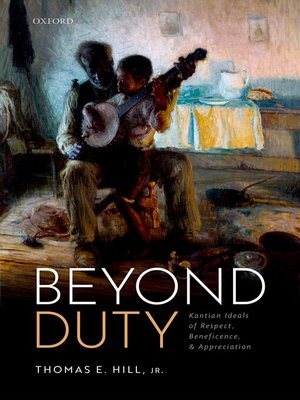
Sign up to save your library
With an OverDrive account, you can save your favorite libraries for at-a-glance information about availability. Find out more about OverDrive accounts.
Find this title in Libby, the library reading app by OverDrive.



Search for a digital library with this title
Title found at these libraries:
| Library Name | Distance |
|---|---|
| Loading... |
Beyond Duty presents a new collection of essays on Kantian moral theory and practical ethics from a distinguished philosopher known for making Kantian ethics accessible and relevant to contemporary problems. With a new emphasis on ideals beyond the strictest requirements of moral duty, Thomas E. Hill, Jr. expands the core aspects of Kantian ethics and offers a broader perspective on familiar moral problems. Some essays explain Kantian concepts, while others review work of leading contemporary philosophers or raise challenging ethical questions for more general audiences. Crucially, Hill develops an ethical ideal of appreciation of people and their lives. Distinguished from both respect and beneficence, this has important implications about how we should think about close personal relationships, such as friendships, families, and relationships with people with disabilities. Part I focuses on Kantian moral theory. Topics include the structure of Kant's argument in the Groundwork; his idea of imperfect duties to oneself; autonomy; and human dignity. Rawls' constructivism is defended against O'Neill's objections, and Kantian ethics defended against the charge of utopian thinking. Part II focuses on practical ethics, including the ethics of suicide; philanthropy; conscientious objection; and tragic choices when it seems that every alternative offends against human dignity. An essay on moral education contrasts Kantian and Rawlsian perspectives; another traces the role of self-respect in Rawls' theory of justice and contrasts a Kantian conception. The volume concludes with two essays that develop and illustrate the ideal of appreciation.







